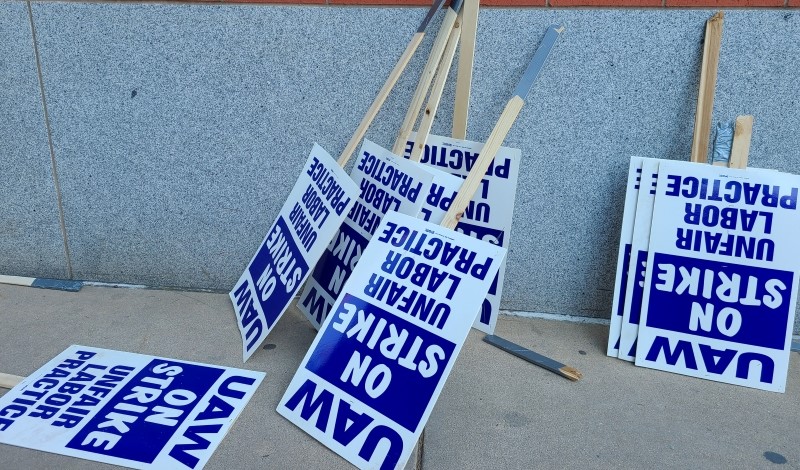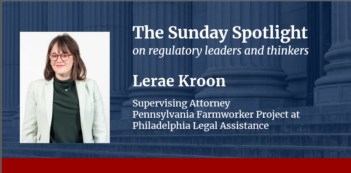
Scholars argue that the best way to improve labor law is to change union election rules.
For decades, activists seeking to improve the fate of workers have argued that the U.S. Congress should amend the National Labor Relations Act—a critical law that protects employees in forming unions.
But are these advocates wasting their energy?
Yes, according to some scholars. In an article for the Missouri Law Review, law professors Leonard Bierman, Rafael Gely, and William B. Gould IV argue that statutory labor reform may be a pipe dream in the current legislative and judicial climates. Instead, Bierman and his coauthors contend that a more realistic avenue for reform is through changes to union election rules.
Data from the U.S. Bureau of Labor Statistics indicates a decline in unionization in the United States. Bierman and his coauthors explain that many supporters of the labor movement believe that this decline is a result of inadequacies in federal law. To address these inadequacies, advocates have thrown their support behind legislation that would ramp up legal protections for workers against employer interference of organizing activity.
But this “law-centric” approach mischaracterizes the problem, Bierman and his coauthors argue.
The Bierman team points out that other factors, such as market forces, automation, and legal workarounds by employers may impact workers even more than the law itself. The Bierman team warns, furthermore, that pro-worker legislation has little hope of passing through a divided Congress or surviving constitutional challenges in the current Supreme Court.
Bierman and his coauthors recommend that labor advocates shift their focus away from Congress and toward the power of the National Labor Relations Board, the agency that enforces the National Labor Relations Act, to enact union election reform. The Bierman team contends that Board-initiated changes could boost union activity while at the same time bypassing the need for unlikely legislative action. Such smaller scale reforms would also be more likely to survive challenges in court, Bierman and his coauthors argue.
The Bierman team proposes three modifications to union elections to protect workers.
Bierman and his coauthors first argue that expanded mail balloting would allow workers to participate in union elections free from employer interference. The National Labor Relations Act gives local Board officials the discretion to decide on a case-by-case basis whether an election should be held in-person or using mail ballots. In general, however, the Board only allows mail balloting when circumstances make in-person voting infeasible.
None of the common criticisms of mail balloting justify the Board disfavoring its use, Bierman and his coauthors contend. They assert, for example, that there is no evidence that mail balloting compromises election integrity, lowers participation rates, or puts employees at any greater risk of being uninformed about the election process than does in-person voting. To the contrary, Bierman and his coauthors argue that mail balloting better guards workers’ votes than in-person voting by protecting them against intimidation at the voting site.
Bierman and his coauthors next propose that the Board should improve worker access to information by scheduling election debates between employers and unions. Current law limits where, when, and how organizers can share information with employees while on company property. Labor advocates argue that these rules have become so complicated that they deter organizers from exercising their right to communicate with employees. Bierman and his coauthors contend that Board-administered election debates, either on or off the work site, would solve this problem by fostering the free exchange of information without interfering with employer property rights.
Finally, Bierman and his coauthors recommend that the Board adopt policies protecting the rights of employees to seek neutrality agreements with employers. When unions and employers enter neutrality agreements, each promises to abide by certain negotiated terms during the organizing process. These deals, for example, often include provisions in which the employer grants the union physical access to employees or information about employees that they would otherwise not have. In exchange, the agreement might also include provisions under which the union agrees to refrain from certain types of organizing activity, such as picketing.
Bierman and his coauthors argue that the Board should adopt a policy toward neutrality agreements that is more protective of employees. Under current law, the Board sometimes allows employers to discipline employees for “disloyalty” when employees seek to pressure employers into neutrality agreements by making appeals to the public for support. A more protective policy would increase employee power by expanding the reach of their message, Bierman and his coauthors contend.
Citing hostility toward union organization in both the legislature and courts, Bierman and his coauthors emphasize the need for realistic labor law reform. They argue that pushing for reform at the level of union elections, although a modest path, may be the most achievable one to support workers’ rights.



